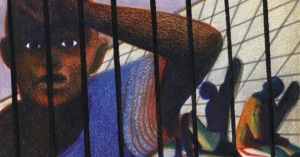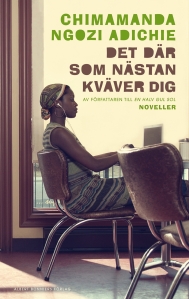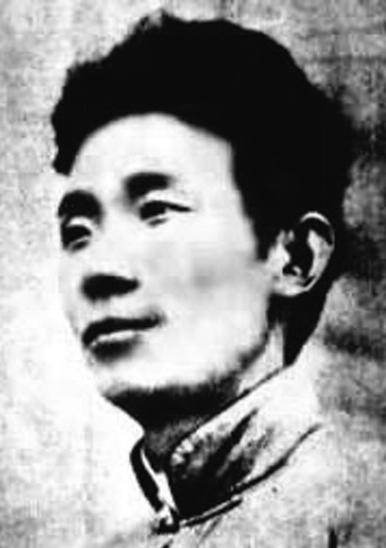(Trigger warning for discussions of poor prison conditions and torture)
It is probable Chimamanda Ngozi Adichie does not need an introduction. She´s the writer everybody reads, she tops all the best seller list, and she´s well loved by book lovers of the world. Her most famous work, “Half of a Yellow Sun”, has been adapted into a film. Her books have won numerous awards and to many, she´s an introduction to African Literature. Gushing about “Americanah” or “Half of a Yellow Sun” is expected from everyone. While indeed her novels are masterpieces, very few people have actually talked about her short story collection, “The Thing around your neck”. It is a shame, because in her stories she deals with many important issues such as sexism, racism, homophobia and colonization. Her short story collection is diverse not only by including many LGBT-characters and having a cast full of POCs, but also in different story settings. She has a historical story, stories about rich people, stories about poor people, a story about writers, stories of politics. The narration also differs in tone in many stories. And while perhaps not all the stories are great, they all capture a certain truth about ordinary lives.
“Cell One” is narrated by a young girl, who is in fact not the real protagonist of the story. Her narration is done by casting a cynical, fed-up eye on her rowdy and small criminal big brother, Nnanamadia, and her parents who continually enable his behavior. The family is fairly wealthy and the brother in fact is heavily implied to continually even steal from his own family. His criminal behavior comes from his involvement with gangs at his university, which early in the story leads him into being imprisoned. This comes as a terrible blow to the parents, but the narrator sees this as her brother getting his just deserts. While it´s never explicably stated, this resentment most certainly comes from parental favoritism and a sense of the brother using his male privilege to get his parents to let him get away with terrible behavior. This dynamic reminded me of Jamaica Kincaid’s memoir, “My brother”, where Ms. Kincaid discussed parental favoritism combined with gendered double standards: her mother would allow her brother to be a slacker while being quite tough on her daughter. While the parents are not harsh towards the girl in this story, she on the other hand has become resentful of her brother.

The plot revolves around the family´s visits to the prison. Nnanamadia first is haughty, but slowly he starts to change over the course of the visits. He starts mentioning an old man who has also been brought to the same prison. This man has been arrested since the police couldn´t find his criminal son, and therefore imprisoned him instead despite a lack of evidence he had broken any laws, and to add insult to injury they also threat him with less respect due to him being poor.
As time passes on, Nnanamadia begins to mention and talk about the old man whenever the family visits him. He becomes more and more melancholy in his speech, talking about how the guards are nasty and mean-spirited towards a fragile man who´s harmless. He talks about how no one visits the man, and how the guards neglect the old man in favor of other prisoners. Through the dialogue, the reader begins to notice a huge change in Nnamanadia; before he was conniving and self-centered, but after his witnessing of the fate of the old man, he has begun a venture of human maturation into an empathetic person who sees outside of his own world. With every visit he goes further into his metamorphosis. A particular telling moment is when the parents bring food for Nnamanadia during their visit. Nnanamadia looks at the food, and quietly states that he wants to give it to the old man, who is not properly fed in the prison. The guards blandly and blankly state that this is not allowed; Nnanamadia just silently stares at this offering of food from the family torn and distrait at the inhumanities brought up in the gift. He´s attachment to the old man makes him want to for the first time in his life prioritize someone else besides himself.
In the climax of the story, Nnanamadia is taken into cell one, where he is severely beaten as a form of torture. And frankly, when the guards tell the parents why this horror is visited on Nnanamadia it becomes as intellectually appalling as emotionally wrenching experience for the reader.
What makes “Cell one” such an incredibly story is that it packs many social and political issues such as corruption, harsh prison conditions and class into a narrative lodged acutely in the intimate and personal. The issues are deeply tied with the character growth of Nnanamadia and his tale of growing understanding casts the reader into an optimistic stance of the possible and hopeful side of human behavior. It is contrasted by the guard’s cruelty, which makes them a great foil to Nnanamadia. There´s an old saying in the feminist movement, “The personal is political”, which this story captures by showing how politics and corruption affect the old man’s life as well as Nnanamadia´s coming of age. By showing how the machinations of corruption detours, deforms and defeats human lives – and it is the most fundamental aspects of human existence that are at stake in these questions – Adichie´s writing is an ideal example of social commentary done with concerned focus and sure precision.
“Cell one” is a breathtaking tale, and despite not being a novel, has all the great elements of a literary magnum opus. It would, in my opinion, be also amazing to see this story adapted into a film. The prose is perfect, even in the advents of the young girl’s resentment, and the wondrous personal honesty of the voice of the narration flings the reader along an engrossing plot filled with heartbreaking events. This is political fiction at largest and finest.














Åh,vilket bra inlägg! Jag skäms att erkänna att jag inte läst något av Chimamanda Ngozi Adichie ännu… Men har tänkt göra det ett bra tag.
Vilken av hennes böcker rekommenderar du att jag börjar med? jag blir väldigt sugen på att läsa denna. Känns som en bok med mycket tankeväckande teman och som en djupt berörande läsupplevelse.
Ser verkligen fram emot att läsa den men du kanske tycker någon annan av hennes böcker är bättre att börja med? Eller? ^^
Väldigt bra recension också. Super!
Hm… jag antar att de flesta skulle rekommendera att läsa “Halv av en gul sol först”. Men jag själv skulle rekommendera att börja med “Det som nästan kväver dig” eftersom den här berättelsen var så berörande. Samt berättelserna “the arrangers of marriage” och “tomorrow is too far” är så himla bra. Så absolut börja med det här 😉
Tack för de fina orden, glad att du gillade denna recension 🙂 Mvh / Maaretta
Always loved that Adichie understood, and explored in her writing, the multiplicity of stories and the creation of many and meaningful local truths
“Why did people ask “What is it about?” as if a novel had to be about only one thing.”
“The single story creates stereotypes, and the problem with stereotypes is not that they are untrue, but that they are incomplete. They make one story become the only story.”
While still seeing that the overarching story which cancels and occults others is a power to make other stories invisible and the knowledge they create diminutive and suspect.
“Some people ask: “Why the word feminist? Why not just say you are a believer in human rights, or something like that?” Because that would be dishonest. Feminism is, of course, part of human rights in general—but to choose to use the vague expression human rights is to deny the specific and particular problem of gender. It would be a way of pretending that it was not women who have, for centuries, been excluded. It would be a way of denying that the problem of gender targets women.”
Your review is great at getting to this point in Adichie’s …the intersections of many and the spheres they inhabit. Thanks for this, And for giving a fuller space to the short stories.
Thank you! herb talk about the danger of the single story is such a classic Ted talk. And your spot on about how other stories can be made invisible; Adichie stated once that she grew up reading books about white people and snow, so she grew up believing she could only write about white people. What’s so great about her writing is that she gives a voice to Nigerian people, both in Nigeria and overseas, both male and female, gay and straight, free and imprisoned. Feminism is a big issue in her short sorry collection which is cool 🙂
I have always believed the short story had an important place in literature; so I want to defend it and give it space in my blog. This story was amazing I telling such a human story while exploring political things like corruption and privilege. Intersections are often what males Adichie’s writing so powerful 🙂
Thank you for commenting!!
what would you say is the overall social issue discussed in this chapter particular ( Cell One)? In addition to that question, I have to write a paper on this chapter and the social issue discussed in the chapter and from there use an outside source to research on this social issue to give further background information on the issue she discusses. Hopefully I can get some help on understanding what the social issues she talks about in this chapter and then what I could look up for research on the social issue.
This was a really really helpful review that I thought was well done.
Hi,
Well I think Adichie talks about torture, class and gender mostly in this short story. My review goes into more detail.
Thank you so much! Glad this review was helpful 🙂